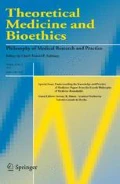Abstract
This paper analyzes statistical decisions during the interim analyses of clinical trials. After some general remarks about the ethical and scientific demands of clinical trials, I introduce the notion of a hard-case clinical trial, explain the basic idea behind it, and provide a real example involving the interim analyses of zidovudine in asymptomatic HIV-infected patients. The example leads me to propose a decision analytic framework for handling ethical conflicts that might arise during the monitoring of hard-case clinical trials. I use computer simulations to show how the framework can assist in reconciling certain ethical conflicts. The framework is partial, lacking the precision of a complete systematization of statistical monitoring procedures in practice.


Similar content being viewed by others
Notes
P((y 2 − y 1) ≥ 4|H0) = 0.058, computed according to the joint probability distribution. E.g., P((y 2 = 7, y 1 = 3)|H0) = (0.117)2 = 0.014.
cc is a loss that can be conceptualized in different ways. For my purposes, it can be understood as the “cost” of having a patient subjected to a new treatment, when that treatment is no better than standard treatment.
Weighted-loss = (loss)*(probability of taking that action).
(0.48 + 10.06)/2 = 5.27, and once divided by 0.17, I reach the multiplicative loss factor of 31.
References
Idänpään-Heikkilä, J., and Sev Fluss. 2005. Emerging international norms for clinical testing. In Ethics and the pharmaceutical industry, ed. M.A. Santoro and T.M. Gorrie, 37–47. Cambridge: Cambridge University Press.
Epstein, S. 1996. Impure science–AIDS, activism, and the politics of knowledge. Berkeley, CA: University of California Press.
Petryna, A. 2009. When experiments travel. Princeton, NJ: Princeton University Press.
Hawkins, J.S., and E.J. Emanuel, eds. 2008. Exploitation and developing countries: The ethics of clinical research. Princeton, NJ: Princeton University Press.
Cannistra, S.A. 2004. The ethics of early stopping rules: Who is protecting whom? Journal of Clinical Oncology 22: 1542–1545.
Buchanan, D., and F. Miller. 2005. Principles of early stopping of randomized trials of efficacy: A critique of equipoise and an alternative nonexploitation ethical framework. Kennedy Institute of Ethics Journal 15: 161–178.
Merigan, T.C. 1990. You can teach an old dog new tricks: How AIDS trials are pioneering new strategies. New England Journal of Medicine 323(19): 1341–1343.
Pocock, S. 1993. Statistical and ethical issues in monitoring clinical trials. Statistics in Medicine 12: 1459–1469.
Volberding, P.A., S.W. Lagakos, M.A. Koch, et al. 1990. Zidovudine in asymptomatic human immunodeficiency virus infection. New England Journal of Medicine 322: 941–949.
Concorde Coordinating Committee. 1994. Corcorde: MRC/ANRS randomised double-blind controlled trail of immediate and deferred zidovudine in symptom-free HIV infection. Lancet 343(8902): 871–881.
Ellenberg, S. 2003. Are all monitoring boundaries equally ethical? Controlled Clinical Trials 24: 585–588.
Acknowledgments
I thank Julian Reiss, David Teira, Jan Vandenbroucke, Teddy Seidenfeld, Jesús Zamora-Bonilla, Scott Anderson, Alan Richardson, the audiences at the philosophy of medicine roundtable at Erasmus University Rotterdam, and the European Philosophy of Science in Amsterdam, for helpful discussion and feedback. Earlier version of this work was also presented at a conference in Toronto (HAPSAT) of which I am also thankful. I am most grateful to Paul Bartha, Hubert Wong, and two anonymous reviewers for their many useful comments, discussions, and criticisms. This work was supported by the department of philosophy at UBC and an earlier travel grant from the Canadian Institute of Health Research (IHSPR).
Author information
Authors and Affiliations
Corresponding author
Rights and permissions
About this article
Cite this article
Stanev, R. Statistical decisions and the interim analyses of clinical trials. Theor Med Bioeth 32, 61–74 (2011). https://doi.org/10.1007/s11017-010-9170-9
Published:
Issue Date:
DOI: https://doi.org/10.1007/s11017-010-9170-9




